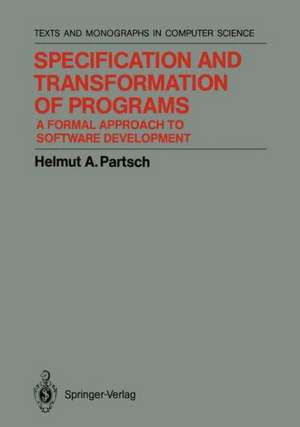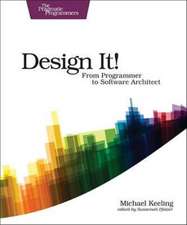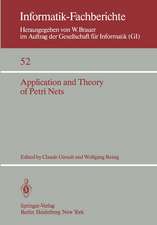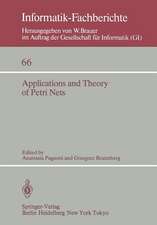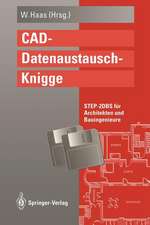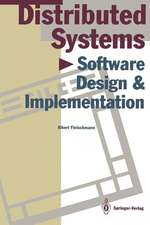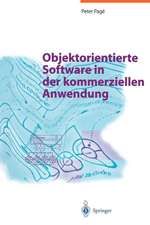Specification and Transformation of Programs: A Formal Approach to Software Development: Springer Texts in Electrical Engineering
Autor Helmut A. Partschen Limba Engleză Paperback – 5 iul 1990
| Toate formatele și edițiile | Preț | Express |
|---|---|---|
| Paperback (1) | 342.96 lei 6-8 săpt. | |
| Springer Berlin, Heidelberg – 5 iul 1990 | 342.96 lei 6-8 săpt. | |
| Hardback (1) | 357.48 lei 6-8 săpt. | |
| Springer Berlin, Heidelberg – 5 iul 1990 | 357.48 lei 6-8 săpt. |
Preț: 342.96 lei
Preț vechi: 428.70 lei
-20% Nou
Puncte Express: 514
Preț estimativ în valută:
65.62€ • 68.52$ • 54.19£
65.62€ • 68.52$ • 54.19£
Carte tipărită la comandă
Livrare economică 15-29 aprilie
Preluare comenzi: 021 569.72.76
Specificații
ISBN-13: 9783540525899
ISBN-10: 3540525890
Pagini: 516
Ilustrații: XIII, 493 p.
Dimensiuni: 170 x 242 x 27 mm
Greutate: 0.71 kg
Ediția:Softcover reprint of the original 1st ed. 1990
Editura: Springer Berlin, Heidelberg
Colecția Springer
Seria Springer Texts in Electrical Engineering
Locul publicării:Berlin, Heidelberg, Germany
ISBN-10: 3540525890
Pagini: 516
Ilustrații: XIII, 493 p.
Dimensiuni: 170 x 242 x 27 mm
Greutate: 0.71 kg
Ediția:Softcover reprint of the original 1st ed. 1990
Editura: Springer Berlin, Heidelberg
Colecția Springer
Seria Springer Texts in Electrical Engineering
Locul publicării:Berlin, Heidelberg, Germany
Public țintă
GraduateCuprins
1. Introduction.- 1.1 Software Engineering.- 1.2 The Problematics of Software Development.- 1.3 Formal Specification and Program Transformation.- 1.4 Our Particular View of Transformational Programming.- 1.5 Relation to Other Approaches to Programming Methodology.- 1.6 An Introductory Example.- 2. Requirements Engineering.- 2.1 Introduction.- 2.2 Some Formalisms Used in Requirements Engineering.- 3. Formal Problem Specification.- 3.1 Specification and Formal Specification.- 3.2 The Process of Formalization.- 3.3 Definition of Object Classes and Their Basic Operations.- 3.4 Additional Language Constructs for Formal Specifications.- 3.5 Structuring and Modularization.- 3.6 Examples.- 3.7 Exercises.- 4. Basic Transformation Techniques.- 4.1 Semantic Foundations.- 4.2 Notational Conventions.- 4.3 The Unfold/Fold System.- 4.4 Further Basic Transformation Rules.- 4.5 Sample Developments with Basic Rules.- 4.6 Exercises.- 5. From Descriptive Specifications to Operational Ones.- 5.1 Transforming Specifications.- 5.2 Embedding.- 5.3 Development of Recursive Solutions from Problem Descriptions.- 5.4 Elimination of Descriptive Constructs in Applicative Programs.- 5.5 Examples.- 5.6 Exercises.- 6. Modification of Applicative Programs.- 6.1 Merging of Computations.- 6.2 Inverting the Flow of Computation.- 6.3 Storing of Values Instead of Recomputation.- 6.4 Computation in Advance.- 6.5 Simplification of Recursion.- 6.6 Examples.- 6.7 Exercises.- 7. Transformation of Procedural Programs.- 7.1 From Tail Recursion to Iteration.- 7.2 Simplification of Imperative Programs.- 7.3 Examples.- 7.4 Exercises.- 8. Transformation of Data Structures.- 8.1 Implementation of Types in Terms of Other Types.- 8.2 Implementations of Types for Specific Environments.- 8.3 Libraries of Implementations.- 8.4 Transformation of Type Systems.- 8.5 Joint Development.- 8.6 An Example: Cycles in a Graph.- 8.7 Exercises.- 9. Complete Examples.- 9.1 Warshall’s Algorithm.- 9.2 The Majority Problem.- 9.3 Fast Pattern Matching According to Boyer and Moore.- 9.4 A Text Editor.- References.
